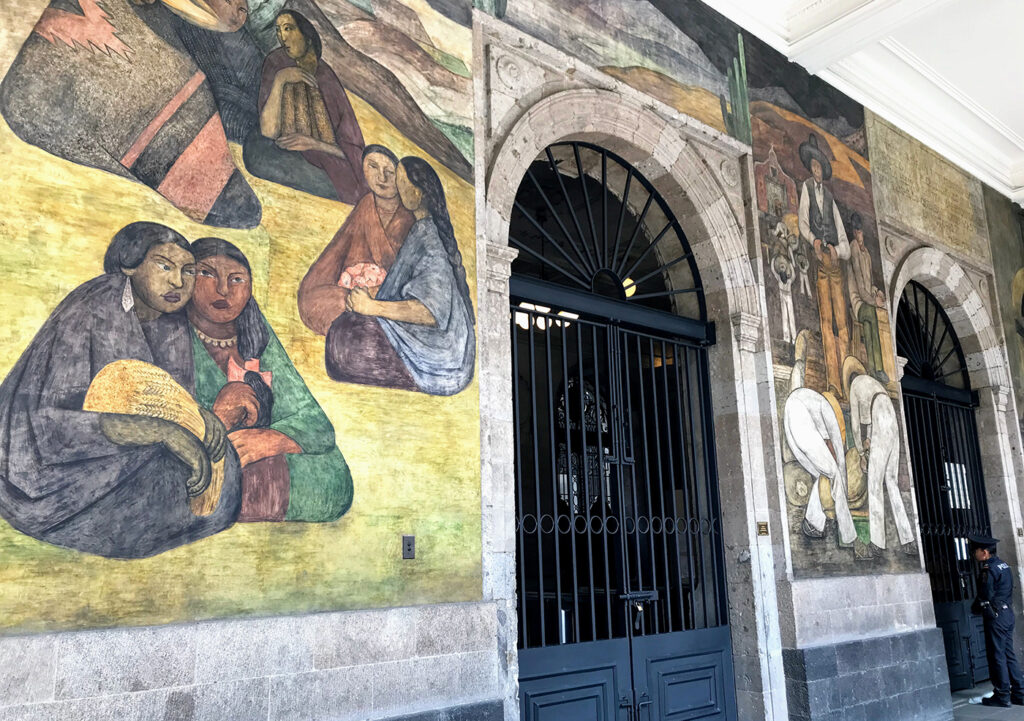
I’ve taught a variety of courses, from cozy graduate seminars to lectures with hundreds of undergraduate students. I’ve worked with diverse groups of students, including first-generation college students, non-native speakers of English, and international students. I’m privileged and proud to have taught at one of Europe’s oldest universities and two Research 1 universities that are also Hispanic-Serving Institutions. I also helped build and launch the world’s first doctoral program in Latin American and Latinx studies and I’m now training, mentoring, and advocating for a new generation of scholars. In 2010, my students and colleagues at UC Santa Cruz honored me with the Excellence in Teaching Award.
In addition to building on and advancing my own research, my courses hone my students’ reading, writing, and critical thinking skills by highlighting the connections between past and present; between the local and the global; between social forces and human agency; and among text, idea, theory, and society. Whether I’m teaching graduate students or undergraduates, a large lecture or an intimate seminar, my courses explore the uneven distribution of power in our world and the myriad ways people have responded and continue to respond to that unevenness.
Introduction to Latin American and Latino Studies (LALS 1)
The gateway to the LALS major, this course introduces students to interdisciplinary approaches to topics and issues covering the Américas. Our focus is hemispheric and we examine the intertwined social, political, and economic, and cultural histories of Latin America, the United States, Latin Americans, and Latina/o/x/e peoples. Focusing on key concepts, we deploy a transnational approach that highlights the deep yet insufficiently understood interconnectedness of peoples and regions of the Américas. See my syllabus.
Cultural Theory in the Americas (LALS 100B)
Focusing on key terms and approaches in the humanities, this course analyzes some of the cultural processes and products that shape social life, institutions, discourses, and identities in Latinx America. It covers a broad range of texts, including poetry, journalism, photography, art, and film, paying attention to the conditions of their production. Above all, it highlights the ways cultural practices and products not only reflect, but generate and contest meaning and power. View the syllabus here.
Immigration and Assimilation (LALS 112)
Organized around three ports of entry, Ellis Island, Angel Island, and the US-Mexico border, this comparative ethnic studies course studies the movement of people to and from the United States. We examine the relationships between immigration and assimilation and between assimilation and citizenship, formal and informal alike, and we study the ways social structures and relationships have presented different groups of people with different opportunities, challenges, and barriers for entering into and participating in US society.
Latinx Literature: Assimilation (LALS 131)
This course uses literary works by and about Latinxs to explore the theme of Latinx assimilation in the United States. Focusing on key concepts in Latinx studies and contemporary English-language writings, we cover a range of forms and genres as we study the ways Latinx writers have articulated mainstream, margin, sameness, difference, and resistance. See my syllabus.
Speculative Fiction and Chicanafuturism (LALS 137)
Focusing primarily on Mesoamerica and Mexican America, this online course explores the nexus of race, gender, science, technology, the environment, and the future in Chicanafuturist works from the 1960s through the twenty-first century. Access my syllabus.
Global Seminar: Latin American Spain (LALS 184S)
Students in this course will spend five weeks in Madrid examining Spain’s legacy as an imperial power in the Americas and how Latin Americans are transforming Spanish society and culture. Syllabus forthcoming.
Global Internship: Buenos Aires (LALS 190G)
With the support of UC Santa Cruz’s Global Learning program, students in this course work as interns in Buenos Aires, Argentina, over eight weeks in the summer. Combined with the internships, LALS 190G provides students with opportunities for professional development, international travel, cross-cultural exchange, and critical thinking. Students also hone their communication skills, particularly their abilities to read, write, and speak Spanish. Check out my syllabus.
Immigrant Storytelling (LALS 194A)
This senior seminar, for LALS majors exclusively, explores life writing by immigrants and immigrant-adjacent writers. See my syllabus.
Latinx Science Fiction: The Future (LALS 194R+L)
This senior seminar uses science fiction to explore themes, concerns, and questions in Latinx studies, particularly as related to migration, gender, race, labor, and class. Designed for graduating seniors, this course also provides LALS majors with the opportunity to use science fiction, a genre that’s often associated with the future, to reflect on their education and to consider ways to use that education to shape their future. Have a look at my syllabus.
Democracy, Pluralism, Culture (University of California-Lund University Joint Summer School, Lunds Universitet, Lund, Sweden)
How do pluralism and cosmopolitanism, as engendered by migration, challenge democracies? How do democratic nations foster, protect, or threaten pluralism and cosmopolitanism? To address these questions, this course draws from a multidisciplinary array of texts from the United States and heterogeneous, migrant-receiving nations in Western Europe. View my syllabus.
Research in Practice: Epistemology, Ontology, and Ethics (LALS 201)
As the final course of the LALS Department’s core graduate requirements, LALS 201 aims to connect the conceptual discussions of other LALS courses to the design of individual research proposals. During the quarter, we read works by LALS faculty to identify and to understand the research approaches that define the multi- and interdisciplinary field of Latin American and Latinx studies. We pay special attention to connections between the construction of research questions, the genesis or choice of theory or conceptual framework, and the implementation of research strategies evident in these works. Meanwhile, we work step-by-step to develop compelling and feasible proposals for our own research projects. Click here for the syllabus.
Comparison as Method (LALS 205)
This seminar is both an articulation and a study of comparison as theory and method in the humanities and qualitative social sciences. Focusing on how scholars compare race, migration, nation, and empire, we ask, What happens when peoples, places, periods, concepts, and categories are compared? How and why do scholars compare? What methods and sources are available to us? And what are the promises and challenges of a comparative, relational, or transnational approach? This course is designed for graduate students developing comparative or relational research projects in the humanities and social sciences. View my syllabus here.
- Read an interview in which I discuss my hopes for and concerns about the pandemic-era virtual classroom at the Hispanic-Serving Institution.
